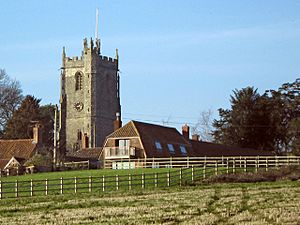Church of St Michael, Enmore facts for kids
Quick facts for kids Church of St Michael |
|
|---|---|
 |
|
| Location | Enmore, Somerset, England |
| Built | 13th and 15th centuries |
|
Listed Building – Grade II*
|
|
| Official name: Church of St Michael | |
| Designated | 29 March 1963 |
| Reference no. | 1177223 |
| Lua error in Module:Location_map at line 420: attempt to index field 'wikibase' (a nil value). | |
The Church of St Michael is a historic church located in Enmore, a village in Somerset, England. This church is a special building, mostly built in the 1400s. However, some parts of it are even older, dating back to the 1100s. It is recognized as a Grade II* listed building, which means it's a very important historical site.
Contents
A Look Back at the Church's History
How Old Is the Church?
The Church of St Michael has been standing for a very long time. While much of what you see today was built in the 15th century (the 1400s), some older parts remain. For example, an arched doorway inside the church dates back to the 12th century (the 1100s). Imagine how many people have walked through that very doorway over the centuries!
Restoring the Church
In 1873, the church underwent a big restoration project. This work was led by an architect named Benjamin Ferrey. Restorations help to fix and preserve old buildings so they can last for many more years.
The Church's Community
The Church of St Michael is part of a larger group of churches. It serves the local community of Enmore. It also connects with churches in nearby villages like Aisholt, Goathurst, Nether Stowey, Over Stowey, Spaxton, and Charlynch. This group of churches works together in the area of Taunton.
Exploring the Church's Design
What Does the Church Look Like?
The Church of St Michael has a classic church design. It features a north aisle with three sections. It also has a chancel and a nave, each with two sections. The main entrance is through a south doorway. This doorway is very old, built around 1185. It has beautiful and detailed carvings.
The Church Tower
The church has a tall tower on its west side. This tower has three levels. Strong diagonal buttresses help to support it. At the very top, there's a small turret above the stairs. Inside the tower, there are six bells. The oldest bell was made in 1647 by William Purdue. Imagine the sound of those bells ringing out over the village!
Inside the Church
Old and Interesting Items
When you step inside the Church of St Michael, you'll find many historical items. There's an octagonal baptismal font from the 13th century (the 1200s). This is where babies would have been baptized hundreds of years ago. You can also see a pulpit from the Jacobean period. This means it was made during the time of King James I, in the early 1600s.
Ancient Chests
The church also holds several old chests. These chests were used to store important items. They range in age from the Middle Ages (around the 1300s) all the way up to the 19th century (the 1800s). Each chest likely has its own story!
The Malet Family Helms
One of the most unique things inside the church are two old helms. These helms belonged to the Malet family. The Malets were important people in the area. They were the lords of the manor and also served as Sheriffs of Somerset. These helms are thought to be from around 1620. They likely belonged to John Malet, who lived at that time.
These helms have an interesting story. They were found in 1833 when parts of Enmore Castle were taken down. After being discovered, they were moved to the church for safekeeping.
The Churchyard
The Ancient Cross
Outside the church, in the churchyard, there is a very old cross. This cross dates back to the 15th century (the 1400s). The tall stone shaft of the cross is about 1.5 meters (nearly 5 feet) high. Sadly, the top part of the cross is missing.
The Churchyard Wall
The wall that surrounds the churchyard separates it from Enmore Castle. This wall was probably built in the 18th century (the 1700s). It has stood for centuries, protecting the peaceful churchyard.
Family Monuments
Within the churchyard, you can also find several old monuments. These include memorials for the Studdier and Waterman families. There are also some older stone tombs that don't have clear names on them. One of these dates back to the early 18th century, and another is even older, from the 17th century.
See also
- List of ecclesiastical parishes in the Diocese of Bath and Wells
 | Audre Lorde |
 | John Berry Meachum |
 | Ferdinand Lee Barnett |

